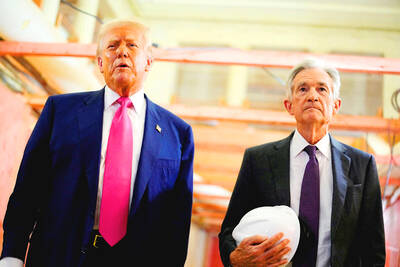Malaysian long-haul budget carrier AirAsia X hopes to expand sales tenfold to US$1 billion by the end of 2010 despite the global slowdown, a report said yesterday.
AirAsia X chief executive Azran Osman Rani told the New Straits Times that the first goal would be to breach 1 billion ringgit (US$276 million) in sales next year.
“The psychological test will be reaching the 1 billion ringgit mark in 2009, barely two years into operations. But we will do it and target US$1 billion for the year after that,” he said.
The report said AirAsia X, which flies to Australia’s Gold Coast, Perth and Melbourne, and Hangzhou in China, will end the year with about 362 million ringgit in sales.
But Azran said that as it takes delivery of 25 Airbus A330-300 aircraft between now and 2013, the company will expand to at least 30 destinations.
“Our model is to be the trunk that connects Southeast Asia with key Asia-Pacific markets such as Australia, China, India, Korea, Japan and the Middle East,” he said.
He said AirAsia X is hoping to fly to five cities in Australia, four to five cities in China, three to four in India, one or two in South Korea, and two or three in both Japan and the Middle East.
AirAsia X and Southeast Asian affiliate AirAsia have sounded an extremely optimistic note in recent months, despite the uncertain global outlook and predictions of doom for airlines.
Earlier this month they scrapped fuel surcharges on all flights to drum up business, as founder Tony Fernandes said that falling oil prices enabled it to make travel more affordable.
“We [AirAsia] are very bullish and very optimistic,” he told the New Straits Times, chiding the Malaysian press for being “negative” about the carrier’s future.
“You are a depressing bunch, but I’m optimistic. My load factors are good, people want to travel ... you have to be innovative,” he reportedly said.

IN THE AIR: While most companies said they were committed to North American operations, some added that production and costs would depend on the outcome of a US trade probe Leading local contract electronics makers Wistron Corp (緯創), Quanta Computer Inc (廣達), Inventec Corp (英業達) and Compal Electronics Inc (仁寶) are to maintain their North American expansion plans, despite Washington’s 20 percent tariff on Taiwanese goods. Wistron said it has long maintained a presence in the US, while distributing production across Taiwan, North America, Southeast Asia and Europe. The company is in talks with customers to align capacity with their site preferences, a company official told the Taipei Times by telephone on Friday. The company is still in talks with clients over who would bear the tariff costs, with the outcome pending further

NEGOTIATIONS: Semiconductors play an outsized role in Taiwan’s industrial and economic development and are a major driver of the Taiwan-US trade imbalance With US President Donald Trump threatening to impose tariffs on semiconductors, Taiwan is expected to face a significant challenge, as information and communications technology (ICT) products account for more than 70 percent of its exports to the US, Chung-Hua Institution for Economic Research (CIER, 中華經濟研究院) president Lien Hsien-ming (連賢明) said on Friday. Compared with other countries, semiconductors play a disproportionately large role in Taiwan’s industrial and economic development, Lien said. As the sixth-largest contributor to the US trade deficit, Taiwan recorded a US$73.9 billion trade surplus with the US last year — up from US$47.8 billion in 2023 — driven by strong

AI: Softbank’s stake increases in Nvidia and TSMC reflect Masayoshi Son’s effort to gain a foothold in key nodes of the AI value chain, from chip design to data infrastructure Softbank Group Corp is building up stakes in Nvidia Corp and Taiwan Semiconductor Manufacturing Co (TSMC, 台積電), the latest reflection of founder Masayoshi Son’s focus on the tools and hardware underpinning artificial intelligence (AI). The Japanese technology investor raised its stake in Nvidia to about US$3 billion by the end of March, up from US$1 billion in the prior quarter, regulatory filings showed. It bought about US$330 million worth of TSMC shares and US$170 million in Oracle Corp, they showed. Softbank’s signature Vision Fund has also monetized almost US$2 billion of public and private assets in the first half of this year,

POWELL SUCCESSOR: US Fed Governor Adriana Kugler’s resignation gives Donald Trump an opening on the board, potentially accelerating his decision on the next chair US President Donald Trump suddenly has a chance to fill an opening at the US Federal Reserve earlier than expected, after Fed Governor Adriana Kugler announced her resignation on Friday. It might also force him to pick the next Fed chair months sooner than he had anticipated. “The ball is now in Trump’s court,” LH Meyer/Monetary Policy Analytics Inc economist Derek Tang said. “Trump is the one who’s been putting pressure on the Fed to do this and that, and Trump says he wants to have his own people on. So now he has the opportunity.” Kugler’s exit unfolds amid unprecedented public pressure